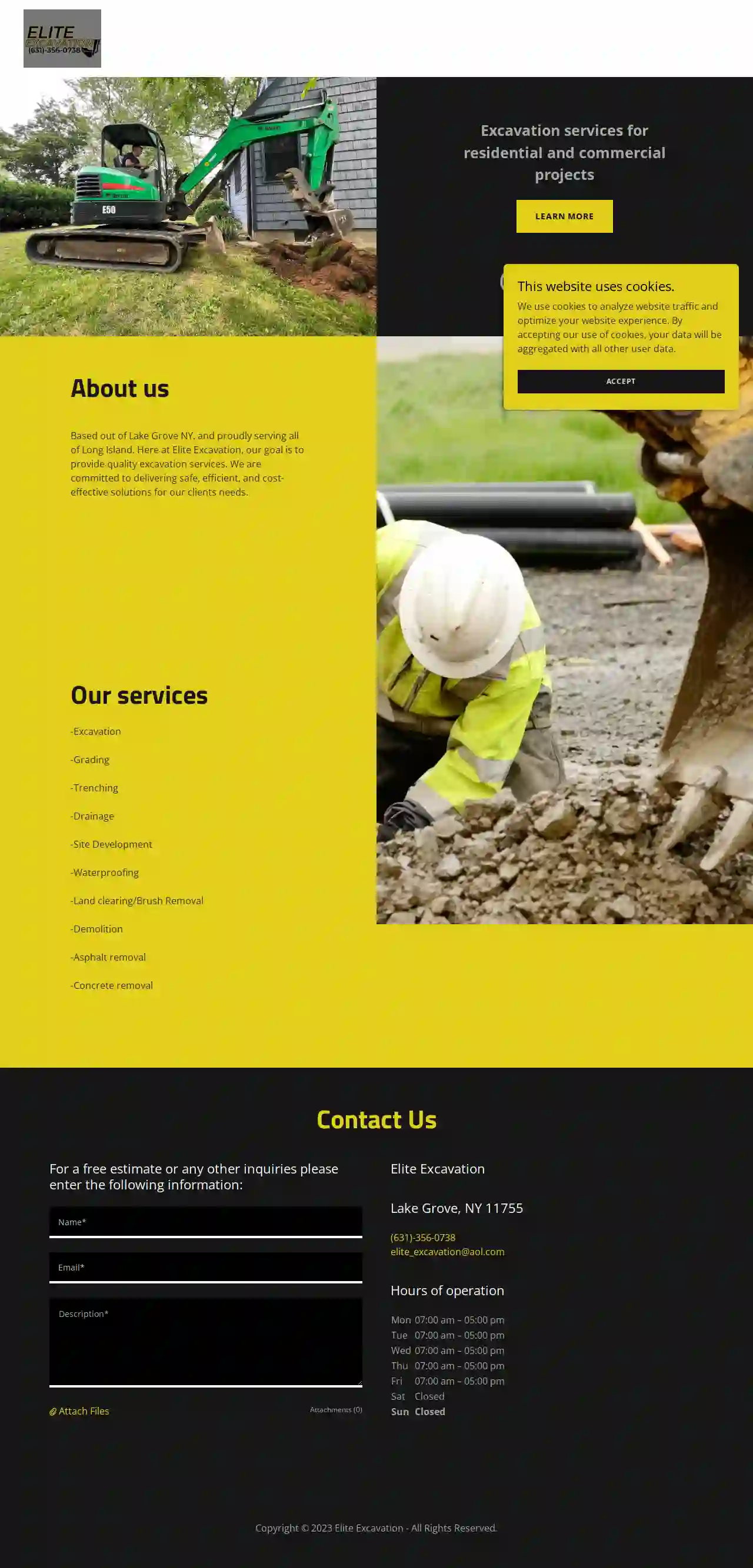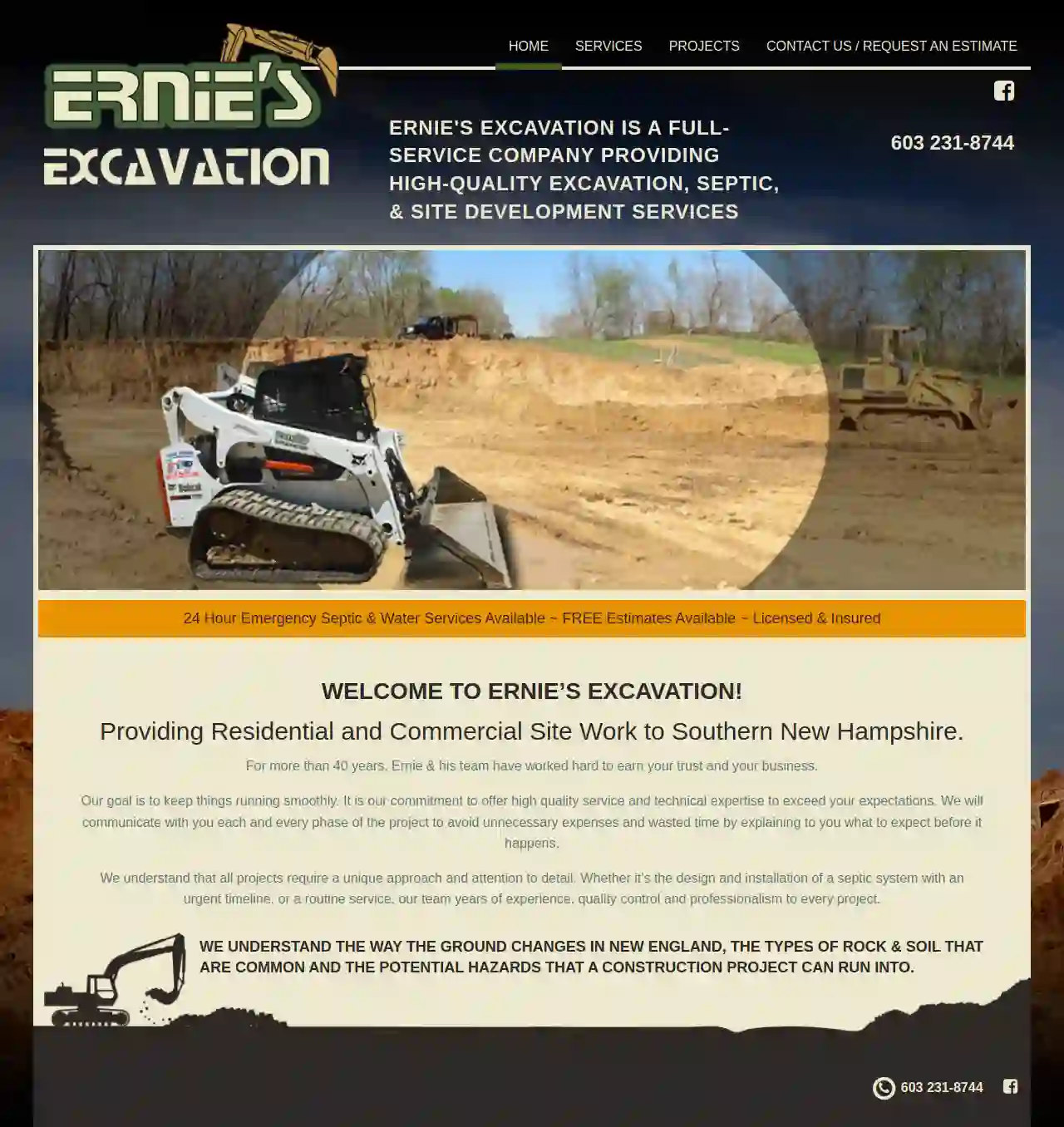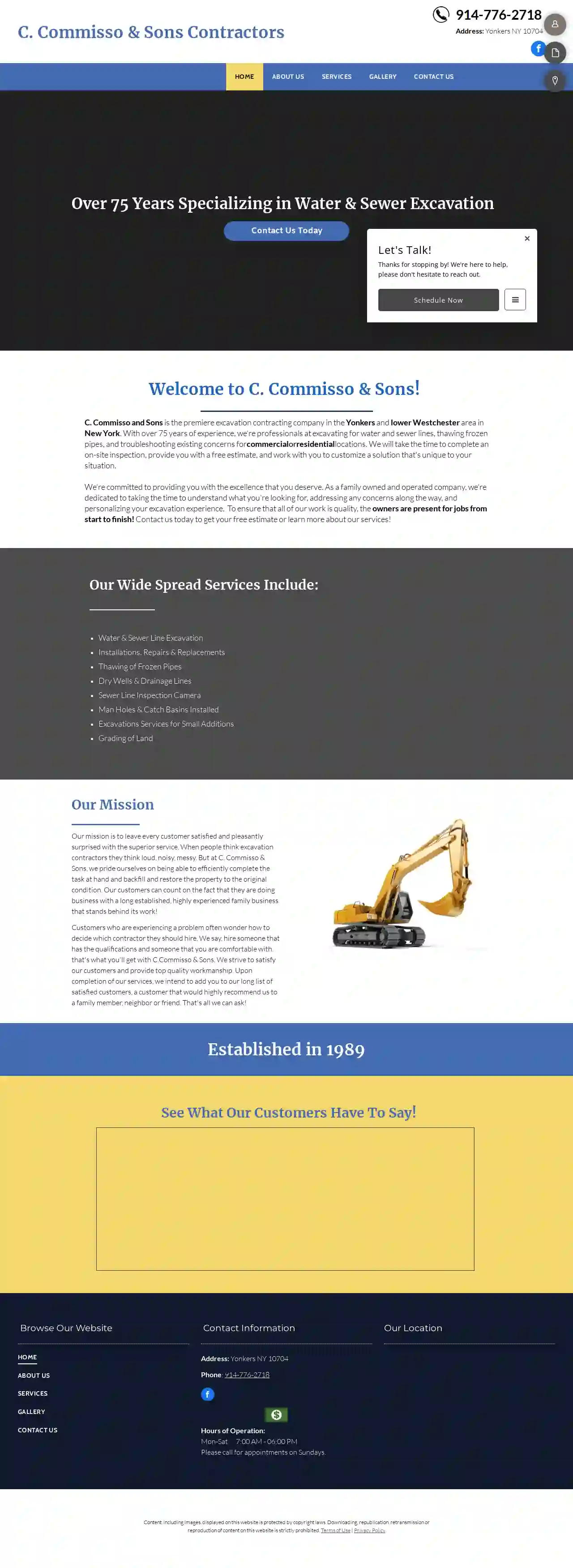Excavation Contractors Baywood
Find the best Excavation Services in Baywood
Get multiple Excavation Contractor quotes for your project today! Compare profiles, reviews, accreditations, portfolio, etc... and choose the best deal.

Buraq Construction Inc
571 reviews1307 Foster Ave, Brooklyn, 11230, USAbout Us Buraq Construction Company was established to offer general construction business in New York City, and has been giving excellent service for more than 10 years. We are the specialists in luxury construction services of the highest standard and safety while keeping up the same standards and quality. Our experienced team is well-versed in navigating the complexities of city regulations and addressing violations efficiently and effectively.
- Services
- Why Us?
- Gallery
Get Quote
Lehigh Construction Group, Inc.
4.26 reviews4327 S Taylor Road, Orchard Park, 14127, USProviding a full array of Construction, Maintenance and Repair Services to meet Client Construction Needs. A trusted commercial general contractor for Buffalo and WNY delivering construction services with two mainstay principles in mind: WORK HARD and TREAT PEOPLE RIGHT. Our team lives by these principles as we strive to deliver the best customer experience - safely & on-time. Smarter Solutions Providing clients with customized construction building services & emphasizing speed-to-market in an environment of trust, collaboration, and transparency for 40 years. Lehigh Project Building Repairs & Maintenance Lehigh PRO service vans are equipped to handle any small construction job. Lehigh PRO performs thousands of building repairs and facility maintenance jobs as one of Buffalo's trusted building repair and facility maintenance providers. Lehigh Pro Emergency Repairs Lehigh PRO emergency repair services provide quick-response maintenance & repair options. As general contractors, PRO crews take steps to ensure work is completed in a safe and timely manner. Lehigh Industrial Services Industrial Plant Small Construction The Lehigh Industrial Services team is fully equipped to handle any plant construction job and our industrial experience with concrete, steel & metal, masonry and sitework sets us apart. Customers include industrial manufacturing plants, chemical, pharmaceutical, agri-business and warehouse & distribution. Get to Know Lehigh Safety Safety is a Lehigh Core Value. Our philosophy remains unchanged – send everyone home safely to their family every day. We remain on the cutting edge of construction industry safety standards and practices by maintaining our commitment to training and educating employees so they perform in the safest manner possible. History Lehigh Construction Group, Inc. was founded in 1984 by Dave Knauss and Tom Glomb as commercial general contractors for Buffalo and Western New York businesses. Over 40 years later we have grown into one of Buffalo’s most trusted commercial general contractors, offering a full array of commercial construction services. From small scale building maintenance repairs to new-builds & plant additions, Lehigh provides expertise in all aspects of construction. Let us be your commercial general contractor.
- Services
- Why Us?
- Gallery
Get Quote
L and M Excavation
52 reviewsClay, USL & M Excavation is a locally owned business, operated by veterans who take pride in the work they do. We constantly stay up to date with the latest equipment and techniques, ensuring that every job is completed safely and efficiently. We specialize in a wide range of land clearing and excavation services. We always deliver the highest quality workmanship and customer service. For a free quote, please contact us today. We are available to answer any questions you may have and are eager to assist you with your project.
- Services
- Why Us?
- Gallery
Get Quote
White's Excavation and Land Services
520 reviewsLaurel, Delaware, USWelcome to Whites Excavation and Land Services! With years of experience and our commitment to quality work, we are the premier excavation and land services provider in Delmarva. Our team of professionals provides a range of services to meet the needs of our clients, from land clearing to site preparation and demolition. We have worked with a variety of commercial, industrial, and residential customers, providing them with quality services on time and within budget. Our commitment to customer satisfaction and safety is unmatched, and our years of experience make us the go-to provider of excavation and land services in the area. Whether you’re preparing for a residential build or clearing a path for commercial property, you can rely on Whites Excavation & Land Services. You’ll be impressed by our level of commitment and attention to detail!
- Services
- Why Us?
- Gallery
Get Quote
Elite Excavation
51 reviewsLake Grove, NY, 11755, USAbout us Based out of Lake Grove NY, and proudly serving all of Long Island. Here at Elite Excavation, our goal is to provide quality excavation services. We are committed to delivering safe, efficient, and cost-effective solutions for our clients' needs.
- Services
- Why Us?
- Gallery
Get Quote
Snead's Outdoor Services LLC
4.713 reviewsLexington, NC, 27292, USWelcome to Snead’s Outdoor Services! With our background in landscaping and machinery, you can count on us to get the job done right! Our vision, our solutions, and our services are all here to help our clients. We offer an array of services with different options to execute each job. We take great pride in the work we do. Our vision is to provide our customers with the peace of mind that they are in good hands with our outdoor experts. Each new project we come across is different from the last. With the equipment and knowledge we possess of our industry, we are able to offer our customers a solution for every project, big or small. We always find a way to complete the job!
- Services
- Why Us?
- Testimonials
- Gallery
Get Quote
RND Construction
54 reviewsLocust Grove, Virginia, USServing Fredericksburg, VA & Surrounding Communities for Over 40 Years At RND Construction, we offer top tier excavation, land clearing and commercial construction services. We work diligently to meet our customer’s needs while adhering to industry standards in quality and safety. We are committed to completing our work with diligence and with extreme attention to detail. RND Construction is your top choice when it is time for your next job. Contact us today, our team is waiting to assist you! Expert & Professional Services Here at RND Construction we provide comprehensive services for homeowners and business owners across Fredericksburg, Virginia and the surrounding communities. We are experts in our field and are dedicated to providing superior workmanship and customer support. With over 40 years of professional experience, customer satisfaction is always our top priority.
- Services
- Why Us?
- Testimonials
- Gallery
Get Quote
Ernie’s Excavation
4.713 reviewsNew York, USWELCOME TO ERNIE’S EXCAVATION! Providing Residential and Commercial Site Work to Southern New Hampshire. For more than 40 years, Ernie & his team have worked hard to earn your trust and your business. Our goal is to keep things running smoothly. It is our commitment to offer high quality service and technical expertise to exceed your expectations. We will communicate with you each and every phase of the project to avoid unnecessary expenses and wasted time by explaining to you what to expect before it happens. We understand that all projects require a unique approach and attention to detail. Whether it’s the design and installation of a septic system with an urgent timeline, or a routine service, our team years of experience, quality control and professionalism to every project. We understand the way the ground changes in New England, the types of rock & soil that are common and the potential hazards that a construction project can run into.
- Services
- Why Us?
- Gallery
Get Quote
C. Commisso & Sons Contractors LLC
52 reviewsYonkers NY, Yonkers, 10704, USOver 75 Years Specializing in Water & Sewer Excavation Welcome to C. Commisso & Sons! C. Commisso and Sons is the premiere excavation contracting company in the Yonkers and lower Westchester area in New York. With over 75 years of experience, we're professionals at excavating for water and sewer lines, thawing frozen pipes, and troubleshooting existing concerns for commercial or residential locations. We will take the time to complete an on-site inspection, provide you with a free estimate, and work with you to customize a solution that's unique to your situation. We're committed to providing you with the excellence that you deserve. As a family owned and operated company, we're dedicated to taking the time to understand what you're looking for, addressing any concerns along the way, and personalizing your excavation experience. To ensure that all of our work is quality, the owners are present for jobs from start to finish! Contact us today to get your free estimate or learn more about our services! Our Wide Spread Services Include: Water & Sewer Line Excavation Installations, Repairs & Replacements Thawing of Frozen Pipes Dry Wells & Drainage Lines Sewer Line Inspection Camera Man Holes & Catch Basins Installed Excavations Services for Small Additions Grading of Land Our Mission Our mission is to leave every customer satisfied and pleasantly surprised with the superior service. When people think excavation contractors they think loud, noisy, messy. But at C. Commisso & Sons, we pride ourselves on being able to efficiently complete the task at hand and backfill and restore the property to the original condition. Our customers can count on the fact that they are doing business with a long established, highly experienced family business that stands behind its work! Customers who are experiencing a problem often wonder how to decide which contractor they should hire. We say, hire someone that has the qualifications and someone that you are comfortable with. that's what you'll get with C.Commisso & Sons. We strive to satisfy our customers and provide top quality workmanship. Upon completion of our services, we intend to add you to our long list of satisfied customers, a customer that would highly recommend us to a family member, neighbor or friend. That's all we can ask! Established in 1989 See What Our Customers Have To Say! "Extremely great company. Very courteous and professional. Highly recommend them." - Wayne S.
- Services
- Why Us?
- Testimonials
- Gallery
Get Quote
TPL Grading and Excavating
56 reviewsHigh Point, NC, 27265, USTPL Grading and Excavating: Your Premier Grading & Excavating Contractor in the Piedmont TPL Grading and Excavating is a trusted and experienced grading and excavating contractor serving the Piedmont Triad area of North Carolina. We specialize in a wide range of services, including: Grading Excavating Lot Clearing Land Clearing Land Management Our team of skilled professionals is dedicated to providing high-quality workmanship and exceptional customer service. We are committed to exceeding your expectations and delivering projects on time and within budget. Whether you're a homeowner, builder, or developer, we have the expertise and resources to handle your project from start to finish. Contact us today for a free estimate and let us help you bring your vision to life.
- Services
- Why Us?
- Gallery
Get Quote
Over 22,076+ Excavation Contractors in our network
Our excavation experts operate in Baywood & surrounding areas!
ExcavationHQ has curated and vetted Top Excavation Companies near Baywood. Find a top & reliable pro today.
Frequently Asked Questions About Excavation Contractors
- Project Size and Scope: The larger and more complex the excavation, the higher the cost.
- Soil Type: Different soil types require different equipment and techniques, impacting costs. Rocky or clay-rich soil can be more expensive to excavate than loose soil.
- Accessibility: Difficult-to-access sites might require specialized equipment or additional labor, increasing expenses.
- Disposal Costs: Hauling away excavated material (soil, rocks, etc.) to disposal sites incurs additional fees.
- Permits and Inspections: Depending on local regulations, permits and inspections might be required, adding to the overall cost.
- Spring and Fall: Often considered favorable due to moderate temperatures and drier soil conditions.
- Summer: Can be suitable, but hot weather can make working conditions challenging and might require additional measures (shade, hydration) for workers.
- Winter: Excavation in winter can be more difficult due to frozen ground, snow, and potential delays caused by inclement weather. It might also require specialized equipment or techniques.
- Clear the Area: Remove any obstacles, including vehicles, outdoor furniture, landscaping features, or structures, from the excavation zone and surrounding area.
- Mark Existing Features: Identify and mark underground utilities, septic tanks, sprinkler systems, or other buried elements you want to protect.
- Protect Landscaping: Use tarps or fencing to shield trees, shrubs, gardens, or other landscaping elements from damage.
- Provide Access: Ensure the excavation contractor has clear access to the work area, including gates wide enough for equipment.
- Discuss Logistics: Coordinate with the contractor regarding parking arrangements, material delivery, and any special instructions or concerns you might have.
- Determining Soil Suitability: Assessing whether the soil can support the intended structure or load.
- Recommending Foundation Types: Advising on the appropriate foundation design based on soil characteristics.
- Addressing Drainage and Erosion Issues: Providing solutions to manage water runoff and prevent erosion.
- Evaluating Slope Stability: Assessing the risk of landslides or soil movement on slopes.
- Building on challenging soil types (expansive clay, loose sand, etc.)
- Constructing large or complex structures
- Excavating near slopes or retaining walls
- Addressing drainage or erosion concerns
How much does excavation cost?
What is the best time of year for excavation?
How do I prepare my property for excavation?
What is a soil engineer, and do I need one?
How much does excavation cost?
- Project Size and Scope: The larger and more complex the excavation, the higher the cost.
- Soil Type: Different soil types require different equipment and techniques, impacting costs. Rocky or clay-rich soil can be more expensive to excavate than loose soil.
- Accessibility: Difficult-to-access sites might require specialized equipment or additional labor, increasing expenses.
- Disposal Costs: Hauling away excavated material (soil, rocks, etc.) to disposal sites incurs additional fees.
- Permits and Inspections: Depending on local regulations, permits and inspections might be required, adding to the overall cost.
What is the best time of year for excavation?
- Spring and Fall: Often considered favorable due to moderate temperatures and drier soil conditions.
- Summer: Can be suitable, but hot weather can make working conditions challenging and might require additional measures (shade, hydration) for workers.
- Winter: Excavation in winter can be more difficult due to frozen ground, snow, and potential delays caused by inclement weather. It might also require specialized equipment or techniques.
How do I prepare my property for excavation?
- Clear the Area: Remove any obstacles, including vehicles, outdoor furniture, landscaping features, or structures, from the excavation zone and surrounding area.
- Mark Existing Features: Identify and mark underground utilities, septic tanks, sprinkler systems, or other buried elements you want to protect.
- Protect Landscaping: Use tarps or fencing to shield trees, shrubs, gardens, or other landscaping elements from damage.
- Provide Access: Ensure the excavation contractor has clear access to the work area, including gates wide enough for equipment.
- Discuss Logistics: Coordinate with the contractor regarding parking arrangements, material delivery, and any special instructions or concerns you might have.
What is a soil engineer, and do I need one?
- Determining Soil Suitability: Assessing whether the soil can support the intended structure or load.
- Recommending Foundation Types: Advising on the appropriate foundation design based on soil characteristics.
- Addressing Drainage and Erosion Issues: Providing solutions to manage water runoff and prevent erosion.
- Evaluating Slope Stability: Assessing the risk of landslides or soil movement on slopes.
- Building on challenging soil types (expansive clay, loose sand, etc.)
- Constructing large or complex structures
- Excavating near slopes or retaining walls
- Addressing drainage or erosion concerns